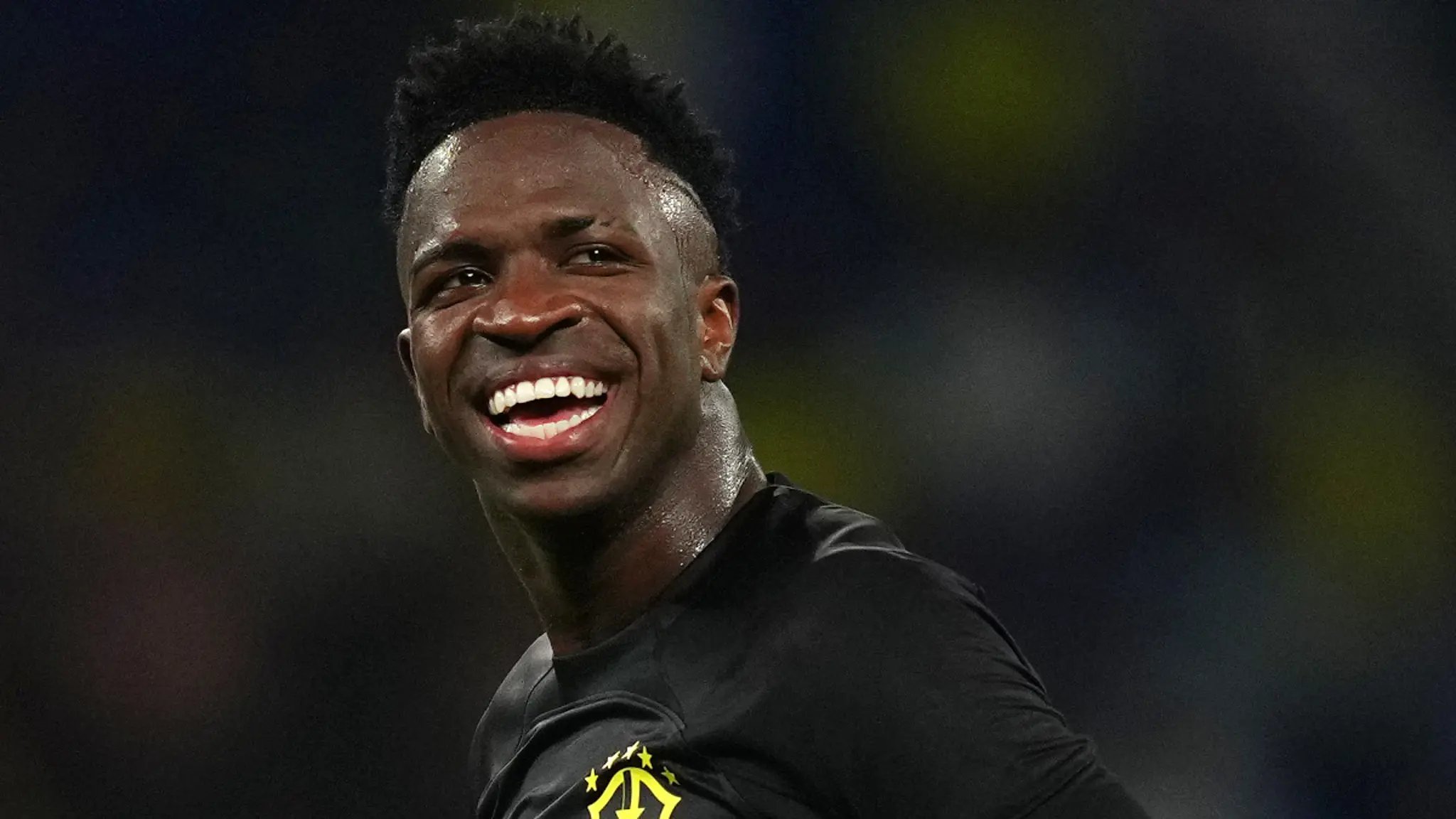Spain
Vinicius Junior’s Advisor Faces Racial Abuse At Brazil Friendly In Spain

Vinicius Junior of Real Madrid is at the center of a desperate fight against racial tensions in Spanish sport. The newest phase occurred at the Brazil-Guinea friendly in Barcelona when Vinicius’ Selecao wore beautiful black jerseys to protest racism. This symbolic act addressed the 22-year-old winger’s ongoing racist harassment, including from Valencia supporters in May. As the globe supported Vinicius, racism in the sport became apparent.
Vinicius Junior revealed an unpleasant event with his adviser, Felipe Silveira, at Espanyol’s stadium entrance on social media. Stadium security reportedly humiliated and mocked Silveira while fiercely playing in the famous black jersey. The frightening incident escalated when a security guard threatened with a banana. After the SporTV video showed Silveira and three other Vinicius employees complaining, the police were called.
Brazil’s Powerful Protest: From Black Shirts To Iconic Yellow And Green
During the first half of the Brazil-Guinea friendly, the Selecao wore all-black jerseys to protest racism. This symbolic action, along with the motto “Com racismo nao tem jogo” (With racism, there is no game), showed Brazil’s unyielding opposition to racism. Vinicius’ 88th-minute penalty, wearing number 10, clinched the win, demonstrating perseverance and solidarity. After the event, the Brazilian Football Federation (CBF) pledged to end racism and seek justice for victims like Silveira.
The football community must again address racism after this tragic tragedy. Despite attempts, the event reminds us that black players are still targeted, requiring more steps to address the core reasons and create a genuinely inclusive and inviting beautiful game.
The Impact Of Vinicius Junior’s Personal Struggle On The Global Football Stage
Vinicius Junior’s fight against racism resonates worldwide. The episodes in Spain, notably the shocking racist abuse of the young Brazilian winger, have reignited the need to end racism in football. Fans, players, and football organizations worldwide have supported Vinicius, highlighting the global problem of football prejudice on social media.
The football community must confront structural concerns perpetuating prejudice as the story progresses. Vinicius becomes a brilliant player and rebels against racial injustice through perseverance and outspokenness. Worldwide outrage over his adviser Felipe Silveira’s abuse highlights the problem and calls for more robust anti-racism measures in sports.
Brazil’s Unprecedented Protest: Shifting The Paradigm In Anti-racism Advocacy
Vinicius Junior led the Selecao in a historic protest against racial discrimination at the Brazil-Guinea friendly. The switch from yellow and green to all-black uniforms shocked the football world and changed the sport’s anti-racism activism. Black clothing with the statement “Com racismo nao tem jogo” (With racism, there is no game) turned a friendly into a protest against racism.
Brazil’s brave protest challenges the current quo and demands action to end football prejudice. The Brazilian Football Confederation’s immediate support for Vinicius Junior and his adviser shows solidarity against discrimination. This daring approach makes a statement in Spain and inspires a worldwide rethinking of how sport treats race.
Read Also: Sloane Stephens Highlights Escalation Of Racial Abuse Against Players
FIFA’s Anti-racism Taskforce And Future Initiatives
FIFA announced preparations for an anti-racism task group in which Vinicius Junior would play a “prominent role.” after the Barcelona incident. This is a growing recognition by the football leadership that individual gestures, however compelling, are inadequate to address racism. The task group is intended to promote systemic change, address discrimination’s core causes, and provide long-term remedies.
The proposed task group commits to long-term, real reform as football fights racism. The Spanish and Brazilian football federations’ cooperation to host a March 2024 friendly at the Santiago Bernabeu underlines the need to tackle racism. These necessity-driven efforts mark a turning moment in the battle against prejudice, expanding football’s inclusion and diversity potential.
Social Media Amplification: A Catalyst For Change In The Battle Against Racism
In the digital era, social media has become a significant tool for fighting football racism. Vinicius Junior’s use of Twitter to expose Felipe Silveira’s alleged racist abuse shows how social media can magnify voices and highlight inequality. Vinicius and the fight against racism in sports received widespread support when the event went viral.
The power of social media to mobilize public opinion and hold institutions accountable is altering anti-racism campaigns. Fans, players, and football organizations worldwide seek fairness, transparency, and structural change in various venues. Social media offers a democratic forum for football’s racism debate and action.
The Psychological Toll: Impact On Vinicius Junior And Those Affected
The psychological effect of racial abuse on players like Vinicius Junior and his counsel, Felipe Silveira, is crucial beyond on-field and stadium gate incidents. The Brazilian winger has been targeted for two seasons, causing emotional and professional damage. Vinicius is tough, but racial hatred’s emotional toll shows the need for comprehensive football assistance.
Felipe Silveira’s tale illustrates racism’s impact on athletes’ support systems. The issue is systemic since advisors, friends, and family are psychologically affected. Mental health treatment and safe spaces for racism victims are essential as football strives to find solutions, realizing the long-term impacts on those affected.
The Imperative Of Strengthening Anti-racism Measures
The incident involving Vinicius Junior’s adviser has revived the need for football institutions to tighten anti-racism procedures. Systemic racism is difficult to eradicate since the accused security guard and security business denied the charges. Comprehensive policy reform, including strict mechanisms to investigate and remedy racist occurrences, is needed to bring about genuine change.
FIFA and other football regulatory bodies must act to make anti-racism measures real. An anti-racism task committee and football federation collaboration are committed to addressing the problem. These measures must be implemented effectively, criminals held responsible, and athletes and their support networks safeguarded from prejudice. The Barcelona tragedy reminds us that fighting racism takes ongoing dedication and effort on various fronts.













You must be logged in to post a comment Login